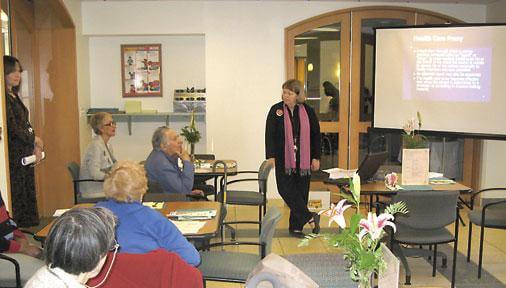The National Healthcare Decisions Day initiative on April 16th was championed at Bon Secours New York Health System in Schervier Nursing Care Center, the Schervier Apartments, and Buena Ayuda Information and Referral Center to help ensure that individuals over age 18 with decision-making capacity have the information and opportunity to communicate and document their healthcare decisions. Approximately 150 individuals received information and forms, and had their questions answered.
At Schervier Nursing Care Center, Susan Caccappolo, MSSW, LCSW, palliative care coordinator, led a two-hour, detailed education session on the topic.
Advance directives come in two main forms: A healthcare proxy or “healthcare power of attorney” names the person you have selected to voice your healthcare decisions if you cannot speak for yourself; and a “living will” states what kinds of medical treatments you would or would not want at the end of your life.
“We expect the impact of National Healthcare Decisions Day to have appreciably increased awareness of the importance of planning in advance for future healthcare decisions, before an emergency occurs,” said Aileen Jones, Bon Secours New York Health System’s vice president of mission.
National Healthcare Decisions Day encouraged the discussion of healthcare preferences, a clarification of individual healthcare values, and the selection of an agent—a healthcare proxy—who will be willing to make healthcare decisions if patients become unable to speak for themselves.
Mahatma Gandhi said, “The future depends on what we do in the present.” Yet in spite of extensive media coverage and public awareness about the need for advance care planning, studies show that most Americans have not exercised their right to make healthcare decisions in the event that they are unable to do so for themselves. According to a 2006 Pew Research Center study, 71% of Americans have thought about their end-of-life treatment preferences; 95% had heard of a living will; but only 29% actually have their own living will. An overwhelming majority of Americans support laws that give patients the right to decide whether they want to be kept alive through medical treatment.
Between 1990 and 2005, the number of people who say they have a living will went from 12% in 1990 to 29% now. Having a living will was associated with lower probability of dying in a hospital for nursing home residents and people living in the community.
It is hoped that physicians will ask patients to discuss their healthcare preferences during advance care planning. It is also hoped that they will provide complete information about artificial nutrition and hydration (ANH), which is associated with uncertain benefits and substantial risks, relevant to the patient’s medical condition, prognosis, and goals for care.
Those involved with creating National Healthcare Decisions Day included health professionals from the American Hospital Association, Aging with Dignity, the American Bar Association, the Center for Practical Bioethics, the Cleveland Clinic, the Association of Professional Chaplains, the National Hospice and Palliative Care Organization, the University of Virginia Medical Center, American Health Decisions, the American Health Lawyers Association, Illinois Hospital Association and the California Coalition for Compassionate Care. Visit www.nationalhealthcaredecisionsday.org for more information.


















